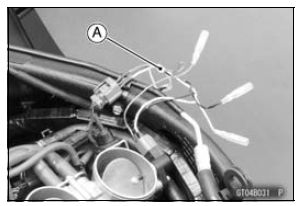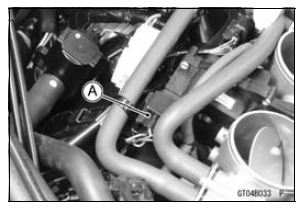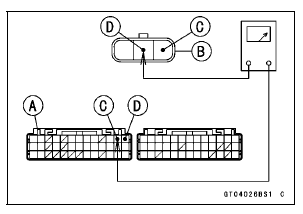

Disconnect the subthrottle sensor connector and connect the setting adapter [A] between these connectors.

Special Tool - Throttle Sensor Setting Adapter: 57001 -1538
Subthrottle Sensor Output Voltage Connections to Adapter: Digital Meter (+) → R (sensor BL/W) lead Digital Meter (–) → BK (sensor BR/BK) lead

ECU Intake Air Temperature Sensor
Output Voltage
Standard: DC 0.8  1.0 V at
1.0 V at
subthrottle valve full close
position (for reference)
DC 4.28  4.32 V at subthrottle valve
4.32 V at subthrottle valve
full
open position
NOTE
0.8 × 4.75 ÷ 5.00 = 0.76 V 1.0 × 4.75 ÷ 5.00 = 0.95 V Thus, the valid range is 0.76 ∼ 0.95 V
If the reading is out of the standard, check the subthrottle sensor resistance (see Subthrottle Sensor Resistance Inspection).
If the reading is within the standard, remove the ECU and check the wiring for continuity between harness connectors.
Special Tool - Hand Tester: 57001-1394
Disconnect the ECU and sensor connectors.
Wiring Continuity Inspection ECU Connector [A] ←→ Subthrottle Sensor Connector [B] BL/W lead (ECU terminal 12) [C] BR/BK lead (ECU terminal 13) [D]

If the wiring is good, check the ECU for its ground and power supply (see ECU Power Supply Inspection in the Fuel System (DFI) chapter).
If the ground and power supply are good, replace the ECU (see ECU Removal/Installation in the Fuel System (DFI) chapter).
 Subthrottle Sensor Input Voltage Inspection
Subthrottle Sensor Input Voltage Inspection Subthrottle Sensor Resistance Inspection
Subthrottle Sensor Resistance InspectionAir Intake Duct Removal
Remove:
Upper Fairing Assembly (see Upper Fairing Assembly
Removal in the Frame chapter)
Meter Bracket (see Meter Unit Removal/Installation in
the Electrical System chapter)
Immobilizer Amplifier [A] (Equipped Models) (see Immobilizer
System Parts Replacement in the Electrical System
...
Storage
Preparation for Storage
Clean the entire vehicle thoroughly
Run the engine for about five minutes to warm the oil, shut it off, and
drain the
engine oil.
WARNINGEngine oil is a toxic substance. Dispose
of used oil properly. Contact
your local authorities for approved disp ...
ABS and KIBS Indicator Lights (LED) Inspection
In this model, the ABS indicator light (LED) [A] and KIBS
indicator light (LED) [B] go on or blink by the data sent
from the KIBS hydraulic unit.
Refer to the Meter Unit Inspection in the Electrical System
chapter.
ABS and KIBS Indicator Lights (LED) Function
*: The mode of “Low ...